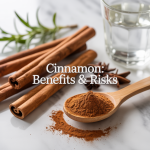Ashwagandha tea has gained popularity as a natural way to manage stress and support overall wellness. This adaptogenic herb, used for centuries in Ayurvedic medicine, offers a gentler alternative to taking supplements in capsule form.
This guide is perfect for anyone curious about adding ashwagandha tea to their daily routine, from wellness enthusiasts exploring natural remedies to busy professionals seeking stress relief options.
We’ll break down the science-backed health benefits of ashwagandha tea and cover important safety considerations you should know before brewing your first cup. You’ll also get a simple step-by-step recipe for making this earthy, slightly bitter tea at home, plus tips for enhancing both its taste and effectiveness.
Understanding Ashwagandha and Its Traditional Uses
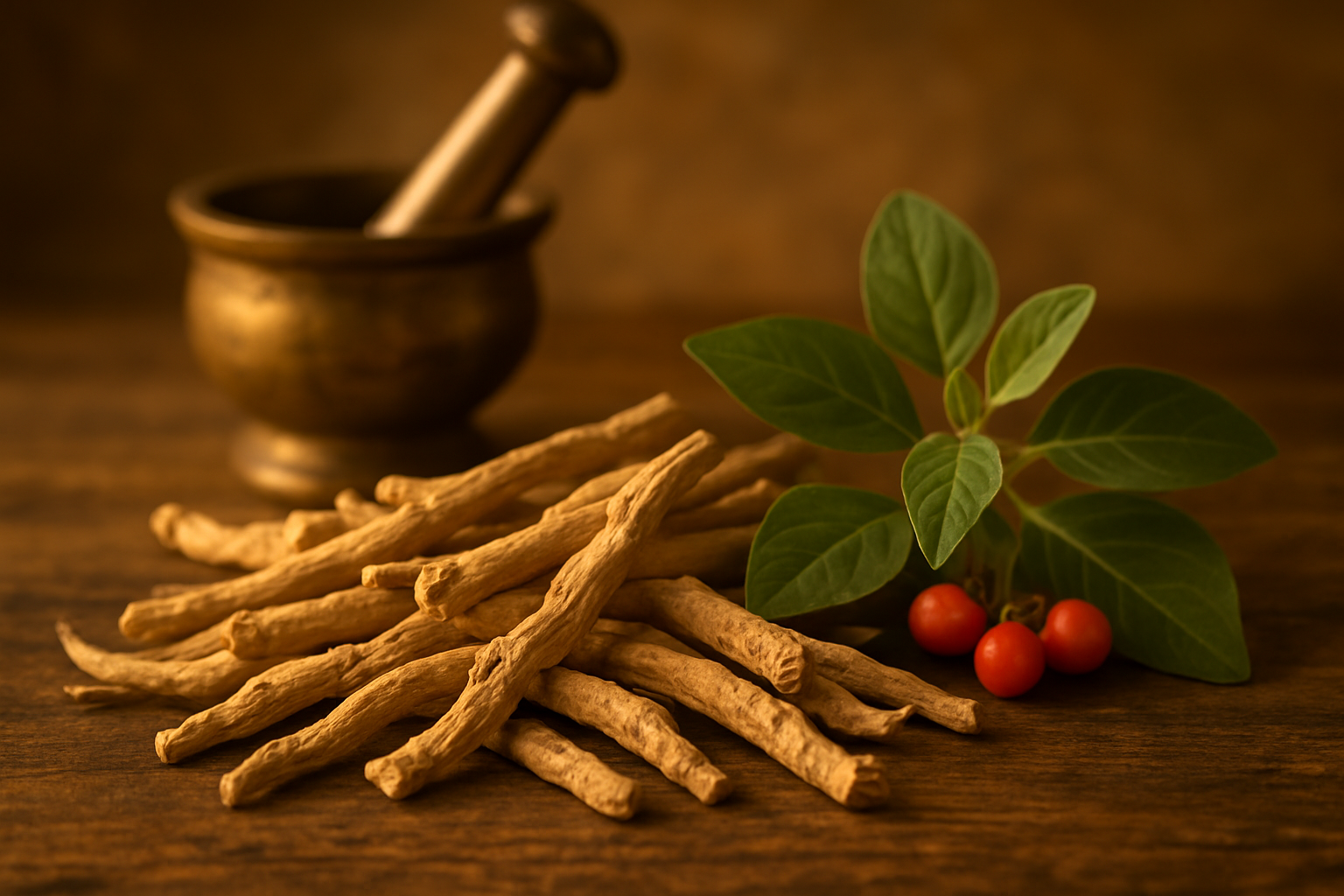
Ancient Ayurvedic herb with adaptogenic properties
Ashwagandha, scientifically known as Withania somnifera, stands as one of the most revered herbs in the ancient Indian medical system of Ayurveda. This hardy shrub, also called winter cherry or Indian ginseng, grows naturally across India, the Middle East, and parts of Africa. The plant’s roots and berries have been harvested for over 3,000 years, earning it a classification as a “rasayana” – Ayurvedic terminology for herbs that promote general health and longevity.
What sets ashwagandha apart is its unique adaptogenic properties. Adaptogens are a special class of herbs that help the body maintain balance during physical, emotional, and environmental stress. These compounds work by supporting the hypothalamic-pituitary-adrenal (HPA) axis, which controls your stress response system. Unlike stimulants that provide temporary energy followed by a crash, adaptogens help normalize bodily functions and build resilience over time.
The herb contains several bioactive compounds responsible for its effects, including withanolides, alkaloids, and saponins. Withanolides, particularly withanoside IV and withanoside VI, are considered the primary active constituents that give ashwagandha its therapeutic properties. These naturally occurring steroids contribute to the herb’s ability to modulate cortisol levels and support overall wellness.
Historical significance in stress management and vitality
Throughout history, ashwagandha has earned nicknames that reflect its powerful reputation. The name itself translates to “smell of horse” in Sanskrit, referring both to its distinctive odor and the traditional belief that consuming it would grant the strength and vigor of a horse. Ancient Ayurvedic texts, including the Charaka Samhita and Sushruta Samhita, documented its use for enhancing physical strength, supporting reproductive health, and promoting restful sleep.
Traditional practitioners prescribed ashwagandha for a wide range of conditions:
- Energy and vitality: Warriors and laborers used it to maintain stamina during demanding physical activities
- Sleep and relaxation: Evening preparations helped calm the mind and promote deeper sleep
- Reproductive health: Both men and women consumed it to support fertility and sexual wellness
- Mental clarity: Students and scholars used it to enhance focus and memory retention
- Immune support: Regular consumption was believed to strengthen the body’s natural defenses
The herb played a particularly important role in managing what Ayurveda calls “ojas depletion” – a condition similar to what we now understand as chronic stress or burnout. Ancient physicians recognized that prolonged physical or mental strain could deplete the body’s vital essence, leading to fatigue, anxiety, and decreased immunity. Ashwagandha was prescribed as a cornerstone therapy to restore this vital energy.
Modern scientific validation of traditional claims
Contemporary research has begun validating many of the traditional uses of ashwagandha through rigorous clinical studies. Over the past two decades, hundreds of peer-reviewed studies have examined its effects on human health, with particularly promising results in stress management and cognitive function.
Multiple randomized controlled trials have demonstrated ashwagandha’s ability to reduce cortisol levels – the primary stress hormone – by up to 30% in chronically stressed adults. These studies typically show improvements in perceived stress levels, sleep quality, and overall quality of life within 4-8 weeks of consistent use.
Research has also confirmed its benefits for physical performance. Studies involving athletes and fitness enthusiasts show that ashwagandha supplementation can increase muscle mass, reduce exercise-induced muscle damage, and improve strength gains when combined with resistance training. One notable study found that participants taking ashwagandha extract experienced significantly greater increases in muscle size and strength compared to those taking a placebo.
| Research Area | Key Findings | Study Duration |
|---|---|---|
| Stress Management | 27-30% reduction in cortisol levels | 8 weeks |
| Sleep Quality | Significant improvement in sleep onset and quality | 6 weeks |
| Muscle Strength | 15-17% greater strength gains | 8 weeks |
| Cognitive Function | Enhanced attention and information processing | 8 weeks |
The scientific community has also validated ashwagandha’s neuroprotective properties, showing its potential to support brain health and cognitive function. Studies suggest it may help protect neurons from oxidative stress and support the growth of nerve cells, which aligns with traditional claims about its memory-enhancing effects.
Health Benefits of Ashwagandha Tea
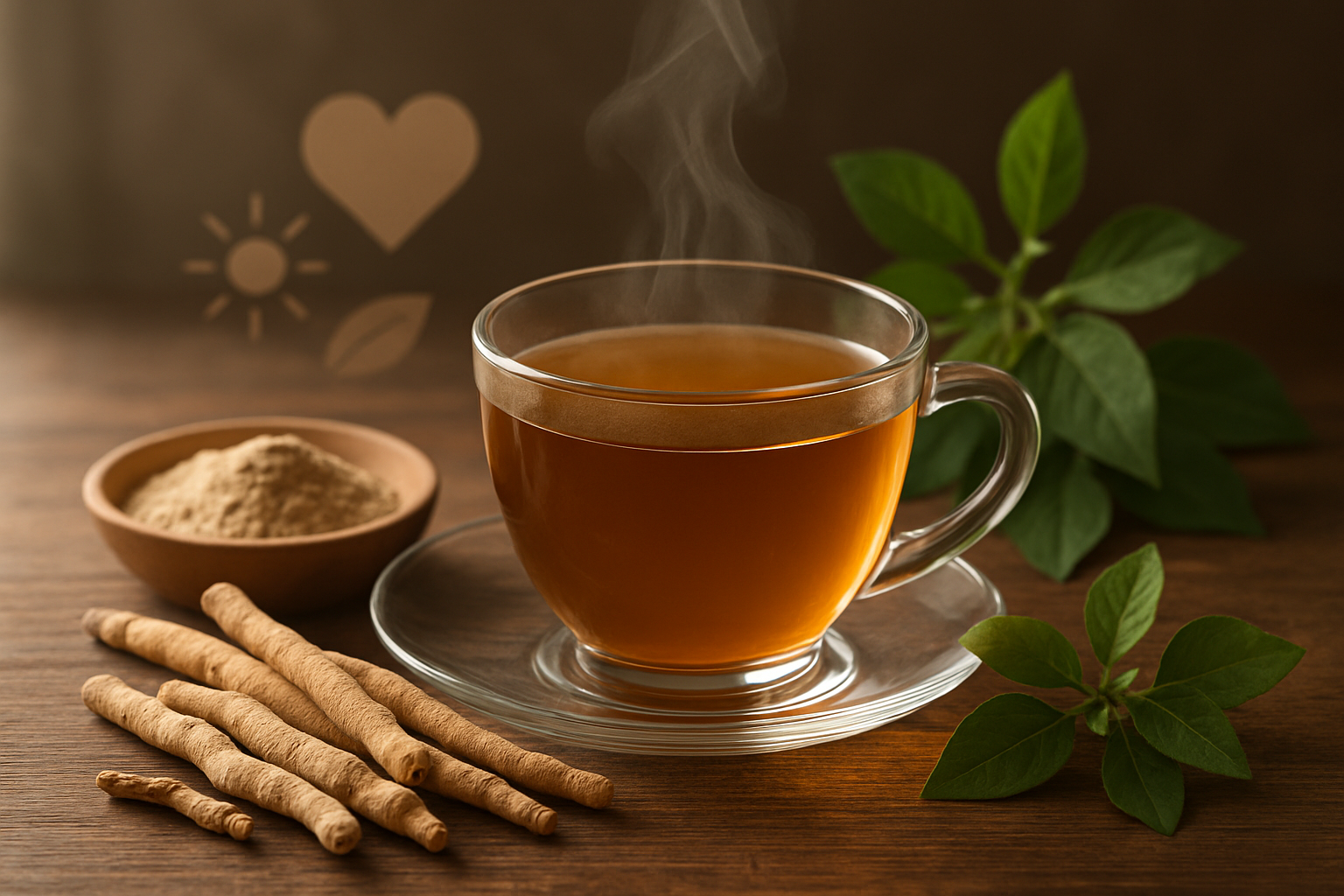
Reduces stress and anxiety levels naturally
Ashwagandha tea acts as a powerful adaptogen, helping your body manage stress more effectively. The key compound responsible for this benefit is withanolides, which work by regulating cortisol levels – your body’s primary stress hormone. When you drink ashwagandha tea regularly, you’re essentially giving your nervous system a natural way to find balance again.
Clinical studies show that people who consume ashwagandha experience significant reductions in perceived stress levels, often within just a few weeks. The herb works by supporting your hypothalamic-pituitary-adrenal (HPA) axis, which controls how your body responds to stressful situations. Instead of feeling overwhelmed by daily pressures, you’ll likely notice a calmer, more centered feeling throughout the day.
What makes ashwagandha tea particularly effective for anxiety is its gentle action. Unlike some pharmaceutical options, it doesn’t create dependency or cause drowsiness during the day. Many people find that sipping warm ashwagandha tea becomes part of their evening ritual, signaling to their body that it’s time to unwind and transition into relaxation mode.
Improves sleep quality and duration
The relationship between ashwagandha and better sleep goes beyond just feeling drowsy. This herb helps regulate your natural sleep-wake cycle by supporting healthy melatonin production and reducing the racing thoughts that often keep people awake at night.
Research indicates that ashwagandha can help you fall asleep faster and enjoy deeper, more restorative sleep phases. People who drink ashwagandha tea before bedtime often report waking up feeling more refreshed and alert the next morning, rather than groggy or sluggish.
The sleep benefits come from ashwagandha’s ability to calm an overactive nervous system. When your mind is constantly processing stress and worry, quality sleep becomes nearly impossible. By addressing the root cause of sleeplessness – an agitated nervous system – ashwagandha tea creates the ideal internal environment for natural, healthy sleep patterns.
For best results, drink your ashwagandha tea about 30-60 minutes before your intended bedtime. This timing allows the compounds to start working as you begin your bedtime routine.
Boosts energy and combats fatigue
While ashwagandha helps with relaxation and sleep, it paradoxically also increases energy levels during waking hours. This isn’t the jittery, artificial energy you get from caffeine, but rather a sustained, natural vitality that comes from better cellular function and improved stress management.
The energy boost happens because ashwagandha supports your adrenal glands, which are responsible for producing energy-regulating hormones. When these glands are overtaxed from chronic stress, you experience fatigue, brain fog, and that “wired but tired” feeling. Ashwagandha tea helps restore proper adrenal function, leading to more consistent energy throughout the day.
Athletes and fitness enthusiasts often use ashwagandha to improve physical performance and reduce exercise-induced fatigue. The herb enhances oxygen utilization in muscles and may increase strength and endurance capacity. Even if you’re not an athlete, you’ll likely notice improved stamina for daily activities and better recovery from physical or mental exertion.
Supports immune system function
Your immune system and stress levels are closely connected – chronic stress weakens immune function, making you more susceptible to illnesses. Ashwagandha tea helps break this cycle by reducing stress while directly supporting immune cell activity.
The herb contains compounds that enhance the activity of natural killer cells, white blood cells that patrol your body looking for threats like viruses and abnormal cells. Regular consumption of ashwagandha tea may help you fight off seasonal illnesses more effectively and recover faster when you do get sick.
Ashwagandha also has anti-inflammatory properties that support overall immune health. Chronic inflammation weakens immune function over time, but the natural compounds in ashwagandha tea help maintain healthy inflammatory responses. This creates a stronger foundation for your body’s natural defense systems.
Many people notice they get sick less frequently after incorporating ashwagandha tea into their routine, especially during high-stress periods or seasonal changes when immune systems typically become more vulnerable.
Enhances cognitive performance and memory
Ashwagandha tea offers significant benefits for brain health and cognitive function. The herb contains neuroprotective compounds that support brain cell health and may even promote the growth of new neural connections.
Regular consumption can improve several aspects of cognitive performance, including attention span, information processing speed, and working memory. People often report feeling mentally sharper and more focused after drinking ashwagandha tea consistently for several weeks.
The memory benefits are particularly notable. Studies suggest that ashwagandha may help with both forming new memories and retrieving existing ones. This happens partly because the herb reduces cortisol levels – high cortisol can interfere with memory formation and recall.
For students, professionals, or anyone dealing with mental fatigue, ashwagandha tea can provide a natural cognitive boost without the crashes associated with stimulants. The improved mental clarity often becomes most apparent during challenging tasks that require sustained concentration or creative problem-solving.
Potential Risks and Side Effects

Interactions with medications and supplements
Ashwagandha can interfere with several prescription medications, creating potentially dangerous interactions. Blood pressure medications like ACE inhibitors and beta-blockers may become too effective when combined with ashwagandha, leading to dangerously low blood pressure. The herb can also amplify the effects of diabetes medications, causing blood sugar levels to drop too low.
Immunosuppressant drugs used after organ transplants or for autoimmune conditions can be counteracted by ashwagandha’s immune-boosting properties. This could lead to organ rejection or flare-ups of autoimmune symptoms. Sedatives and anti-anxiety medications may also become overly potent when mixed with ashwagandha tea, increasing drowsiness and impacting coordination.
Blood-thinning medications like warfarin require extra caution, as ashwagandha might affect clotting times. Always consult your healthcare provider before adding ashwagandha tea to your routine if you take any prescription medications.
Pregnancy and breastfeeding considerations
Pregnant women should avoid ashwagandha tea entirely. The herb can stimulate uterine contractions and may increase the risk of miscarriage or preterm labor. Some compounds in ashwagandha cross the placental barrier, potentially affecting fetal development.
Breastfeeding mothers should also skip ashwagandha tea. While research on nursing mothers is limited, the herb’s active compounds can pass into breast milk. These substances might affect a baby’s developing nervous system or hormone levels. The safest approach is waiting until after weaning before introducing ashwagandha into your wellness routine.
Autoimmune conditions and thyroid disorders
People with autoimmune conditions like rheumatoid arthritis, lupus, or multiple sclerosis should be cautious with ashwagandha tea. The herb stimulates immune system activity, which could worsen symptoms or trigger flare-ups. This immune activation might counteract immunosuppressive treatments prescribed for these conditions.
Thyroid disorders require special attention when considering ashwagandha tea. The herb can increase thyroid hormone production, which might be beneficial for hypothyroidism but dangerous for hyperthyroidism. Those with Hashimoto’s thyroiditis or Graves’ disease should consult their endocrinologist before trying ashwagandha, as it could interfere with thyroid medications or worsen symptoms.
Recommended dosage limits and timing
Start with small amounts when first trying ashwagandha tea. Begin with half a teaspoon of powdered root per cup and observe how your body responds. Most people tolerate 1-2 cups daily, but individual sensitivity varies significantly.
Timing matters for optimal results and minimal side effects. Morning consumption works well for energy and focus, while evening use can promote relaxation. Avoid drinking ashwagandha tea late at night if you’re sensitive to its effects, as some people experience alertness rather than drowsiness.
Daily consumption shouldn’t exceed 6 grams of ashwagandha root powder. Taking breaks every few weeks allows your body to reset and prevents tolerance buildup. Stop immediately if you experience stomach upset, skin rashes, or unusual fatigue, and consult a healthcare professional about appropriate dosing for your specific health needs.
Step-by-Step Guide to Making Ashwagandha Tea

Choosing the Right Ashwagandha Form and Quality
The quality of your ashwagandha tea starts with selecting the right form and source. You’ll find ashwagandha available as whole root, root powder, or standardized extracts, each offering different strengths and flavor profiles.
Whole dried roots provide the most authentic experience but require longer brewing times. Look for roots that are firm, light brown in color, and free from mold or excessive moisture. Root powder dissolves more easily and brews faster, making it perfect for daily use. Choose organic, finely ground powder that maintains its earthy aroma – stale powder often loses its characteristic smell.
For maximum potency, seek products that contain 5-12% withanolides, the active compounds responsible for ashwagandha’s benefits. Third-party tested products offer additional assurance of purity and potency. Avoid products with fillers, artificial colors, or preservatives that can interfere with the herb’s natural properties.
Storage plays a crucial role in maintaining quality. Keep your ashwagandha in airtight containers away from direct sunlight and moisture. Properly stored root powder maintains its potency for 12-18 months, while whole roots can last up to two years.
Proper Brewing Techniques for Maximum Potency
Creating potent ashwagandha tea requires specific brewing methods that extract the beneficial compounds without destroying them through excessive heat. The traditional approach involves gentle simmering rather than boiling, which preserves the herb’s delicate alkaloids.
Start by measuring one teaspoon of ashwagandha powder or one tablespoon of chopped root per cup of water. Heat water to just below boiling point (around 185-200°F) to avoid damaging the active compounds. Add the ashwagandha and reduce heat to maintain a gentle simmer for 10-15 minutes for powder or 20-25 minutes for whole root pieces.
The decoction method works exceptionally well for ashwagandha. This involves simmering the herb in water until the liquid reduces by half, concentrating the beneficial compounds. This traditional Ayurvedic technique creates a stronger, more therapeutic brew.
Straining timing affects both taste and potency. For a milder flavor, strain immediately after brewing. For stronger effects, allow the tea to steep with the herbs for an additional 5-10 minutes before straining. Use a fine mesh strainer or cheesecloth to remove all plant material, as leftover particles can create a gritty texture.
Flavor Enhancement with Complementary Herbs and Spices
Ashwagandha’s naturally bitter and earthy taste benefits greatly from complementary additions that enhance both flavor and therapeutic effects. Traditional Ayurvedic combinations work particularly well, as these herbs have been paired for centuries.
Warming spices like ginger, cinnamon, and cardamom mask ashwagandha’s bitterness while adding their own health benefits. Fresh ginger supports digestion and adds a pleasant zing, while cinnamon provides natural sweetness and helps regulate blood sugar. Add these spices during the brewing process for best integration.
| Herb/Spice | Amount per Cup | Benefits | Flavor Profile |
|---|---|---|---|
| Fresh Ginger | 1/2 inch slice | Digestive support, anti-inflammatory | Warming, spicy |
| Cinnamon Stick | 1 small stick | Blood sugar support, antioxidant | Sweet, warm |
| Cardamom | 2-3 pods | Digestive aid, breath freshener | Floral, slightly sweet |
| Tulsi/Holy Basil | 1 tsp dried | Stress relief, respiratory support | Clove-like, sweet |
| Licorice Root | 1/2 tsp | Natural sweetener, adrenal support | Sweet, mild |
Milk-based preparations create a more palatable drink while potentially increasing absorption of fat-soluble compounds. Traditional ashwagandha milk involves simmering the herb in warm milk with ghee, honey, and spices. Plant-based alternatives like coconut or almond milk work equally well.
For those who prefer sweeter beverages, raw honey added after brewing preserves both the honey’s enzymes and ashwagandha’s compounds. Avoid adding sweeteners during the hot brewing process, as high temperatures can destroy beneficial properties in both ingredients.
Optimizing Your Ashwagandha Tea Experience
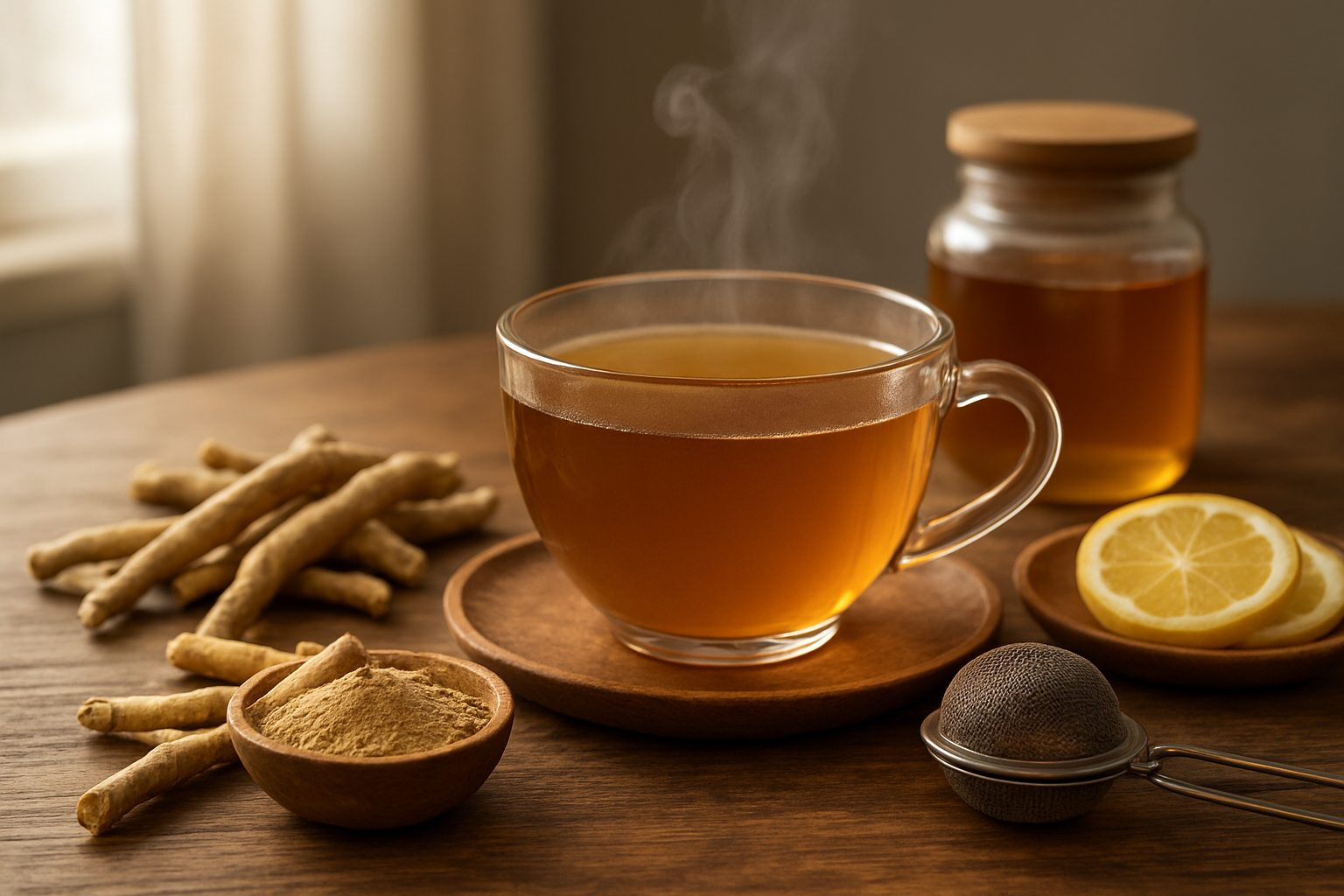
Best times to drink for maximum benefits
The timing of your ashwagandha tea can significantly impact its effectiveness. Morning consumption works well if you’re dealing with chronic stress or anxiety, as the herb’s adaptogenic properties help establish a calm, focused mindset for the day ahead. Many people find that drinking it 30 minutes before breakfast allows for optimal absorption while preventing any potential stomach irritation.
Evening consumption offers different advantages, particularly for sleep quality and recovery. Drinking ashwagandha tea 1-2 hours before bedtime can promote relaxation and deeper sleep cycles. The herb’s cortisol-regulating effects are especially beneficial during evening hours when your body naturally prepares for rest.
Avoid drinking ashwagandha tea immediately after meals, as food can interfere with absorption. Empty stomach consumption typically yields better results, though those with sensitive stomachs might prefer having it with a light snack.
Combining with other wellness practices
Ashwagandha tea pairs exceptionally well with various wellness routines. Meditation practitioners often find that drinking the tea 20-30 minutes before their session enhances mental clarity and reduces racing thoughts. The herb’s calming effects create an ideal mental state for deeper meditation experiences.
Yoga enthusiasts can benefit from pre-practice consumption, as ashwagandha may improve physical endurance and reduce exercise-induced stress. The tea’s muscle-relaxing properties complement stretching and flexibility work.
Sleep hygiene practices become more effective when combined with evening ashwagandha tea consumption. Create a bedtime ritual by brewing the tea alongside other calming activities like gentle stretching, reading, or journaling. This combination signals your body that it’s time to unwind.
For those managing chronic stress, pairing ashwagandha tea with regular exercise amplifies both practices’ stress-reducing benefits. The herb supports recovery while exercise naturally boosts mood and energy levels.
Monitoring your body’s response and adjusting intake
Start with small amounts – typically 1/4 to 1/2 teaspoon of ashwagandha powder per cup of tea. Track your body’s responses in a wellness journal, noting energy levels, sleep quality, mood changes, and any side effects over the first two weeks.
Pay attention to timing-related responses. Some people experience increased energy from morning consumption, while others feel drowsy. If morning tea makes you sleepy, switch to evening consumption and vice versa.
Watch for signs that indicate you need to adjust your dosage:
- Increase signs: Persistent stress symptoms, poor sleep quality, ongoing fatigue
- Decrease signs: Drowsiness during inappropriate times, digestive upset, headaches, irritability
Individual tolerance varies significantly. Factors like body weight, existing health conditions, medications, and stress levels all influence optimal dosing. Start conservatively and gradually increase every few days until you find your sweet spot.
Consider cycling your consumption – many practitioners take ashwagandha for 6-8 weeks, then take a 2-week break to prevent tolerance buildup. This approach maintains effectiveness while allowing your body to reset.
If you experience persistent side effects or unusual reactions, reduce the amount or frequency. Pregnant women, nursing mothers, and people with autoimmune conditions should avoid ashwagandha entirely without medical supervision.
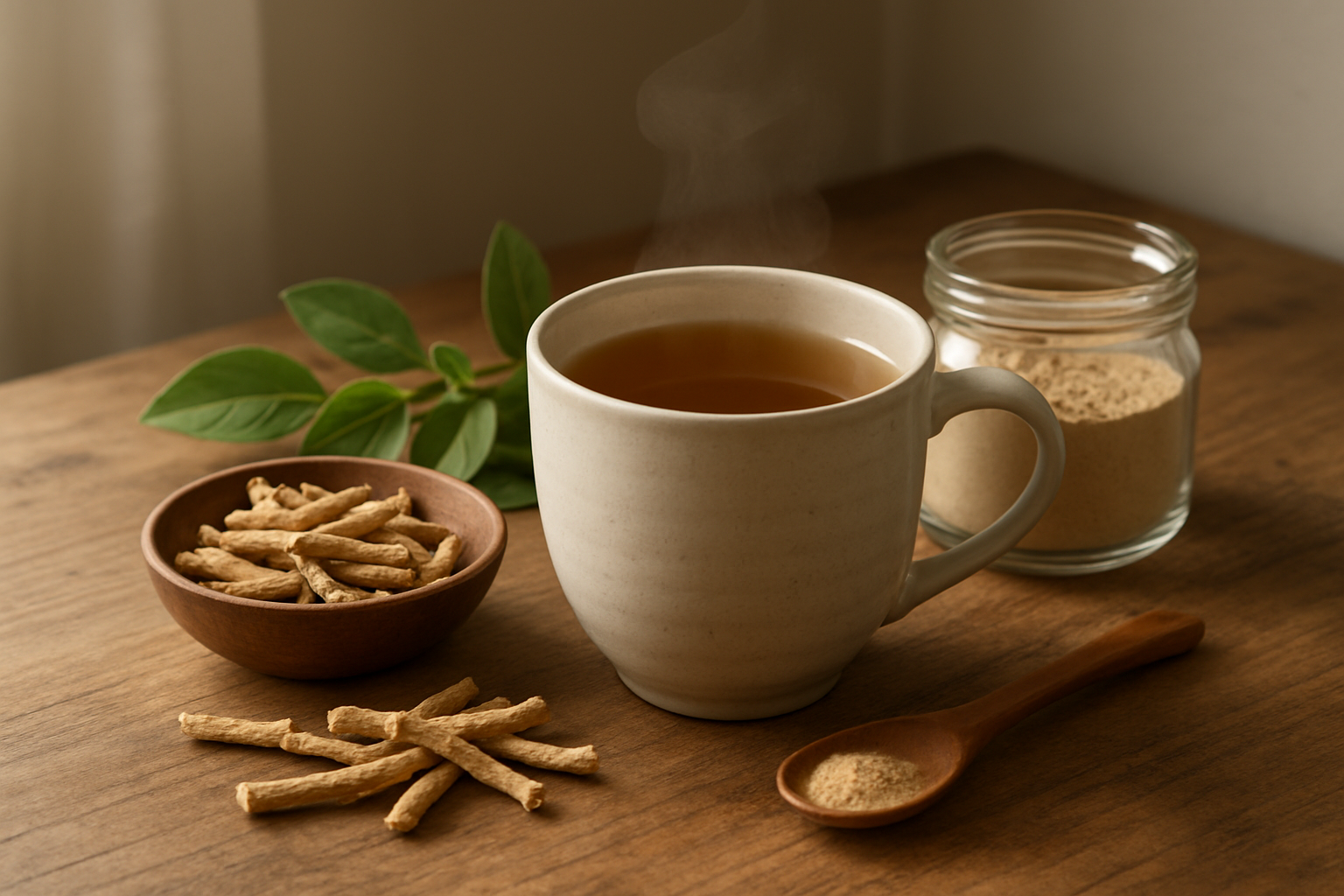
Ashwagandha tea offers a natural way to tap into centuries of traditional wellness wisdom. The adaptogenic herb can help manage stress, improve sleep quality, and boost energy levels when consumed regularly. However, it’s important to start with small amounts and pay attention to how your body responds, especially if you’re pregnant, nursing, or taking medications.
Making your own ashwagandha tea at home is surprisingly simple and gives you complete control over the strength and flavor. Whether you choose the root powder or liquid extract method, adding honey, ginger, or other spices can make your daily cup more enjoyable. Remember to source high-quality ashwagandha from reputable suppliers and consider consulting with a healthcare provider if you have any underlying health conditions. Start with a small daily dose and give your body time to adjust – the benefits of this ancient herb are best experienced with consistency and patience.








